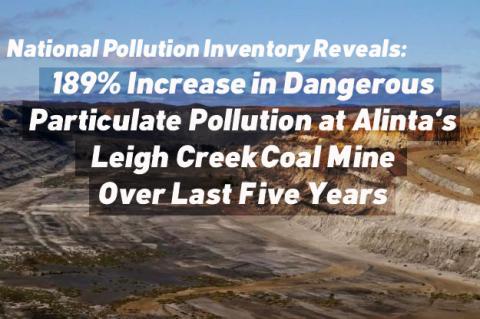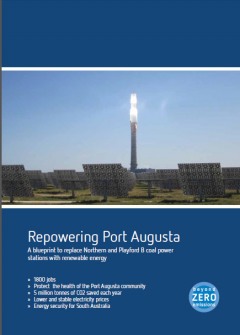New Pollution Data Shows When Coal Isn’t Burnt Port Augusta’s Air Is Clearer, But Pollution Increase at Leigh Creek Coal Mine Major Cause for Concern

New Pollution Data Shows When Coal Isn’t Burnt Port Augusta’s Air Is Clearer, But Pollution Increase at Leigh Creek Coal Mine Major Cause for Concern.
New analysis of pollution data from the National Pollution Inventory showing a reduction in air pollution from the Port Augusta power stations, coinciding with major reductions in their use has been welcomed by the Repower Port Augusta Alliance, however increased pollution at the Leigh Creek coal mine is a major cause for concern. According to Repower Port Augusta this new data demonstrates the improvements in air quality that could come if the power stations were replaced with clean concentrated solar thermal with storage.
“Over the last few years we’ve had one power station mothballed and the other only operating at reduced capacity. This has led to a strong reduction in air pollution from the power stations which is a breath of fresh air for the community” Lisa Lumsden spokesperson for Repower Port Augusta said.
“This community is ready for a transition to solar thermal and this new data demonstrates that Port Augusta could be a much healthier, cleaner place if we replace our polluting power stations with clean solar thermal”.
Despite this reduction, particulate emissions from the Leigh Creek coal mine have dramatically increased by 189% creating a major cause for concern.
“A 189% increase in emissions at the Leigh Creek coal mine is a major cause for concern for the health of workers and people in that community as well as for Port Augusta” Ms Lumsden said.
“We know Alinta want to ramp up their energy production again and have been using a poorer quality coal from Leigh Creek, which could have led to this pollution increase. That coal is now being burnt in Port Augusta so we could see air quality in our community worsen again which would be a big step backwards. In light of Alinta's latest feasibility report, this new data only strengthens the case for Jay Weatherill to step in and make a solar thermal transition happen”.
Nationally the data reveals a major increase in pollution from the coal industry, leading to groups to call for a National Pollution Prevention Act, with an independent regulator ensuring proper pollution monitoring, provision of data and proper teeth if polluters breach pollution controls.
“Repower Port Augusta supports the nationwide call for a National Pollution Prevention Act. The Federal Government needs to do a lot more to ensure the health of our communities”.
For media enquiries: Daniel Spencer 0423 865 632
Key figures:
Air pollution ‘hotspots’ identified in the National Pollution Inventory data include two South Australian communities. Analysis reveals:
- Leigh Creek Coal Mine, has almost trebled its coarse particle pollution (PM10) over the last five years, seeing it rise by 189% over this period.
- Alinta Energy's Northern Power Station, in Port Augusta, is now the 11th highest emitter of PM10 of all Australia’s power stations (506,271kg in total). It is the 9th highest emitter of the very dangerous fine particles (PM2.5).
- Particulate pollution from Northern Power station in Port Augusta has reduced in line with reductions in its operation. PM10 emissions from the facility have reduced 33% over the last 5 years, with data showing the significant reduction began in 2011-12.
PM10 Emissions by Facility
|
Facility |
2008-9 |
2009-10 |
2010-11 |
2011-12 |
2012-13 |
2013-14 |
5 year % Increase /Decrease |
|
Northern Power Station, |
879,353 |
759,134 |
869,378 |
627,176 |
516,161 |
506,271 |
-33% |
|
Leigh Creek Coalfield, Leigh Creek SA |
411,923 |
400,531 |
1,376,573 |
1,602,164 |
1,194,321 |
1,157,185 |
189% |
- South Australia’s coal use has fallen from 32.8% generation share in 2009-10 to 16.8% in 2013-14 (Australian Energy Market Operator, South Australian Fuel and Technology Report, 2015)
- Coal mining is Australia’s leading source of particle pollution. Coal companies reported 380,000 tonnes of PM10 in 2012, 46% of the national total.


